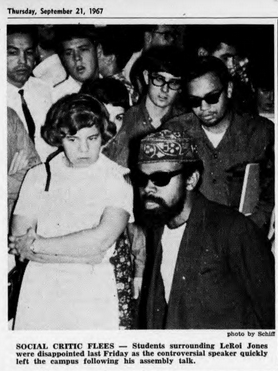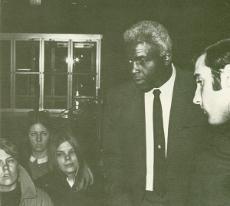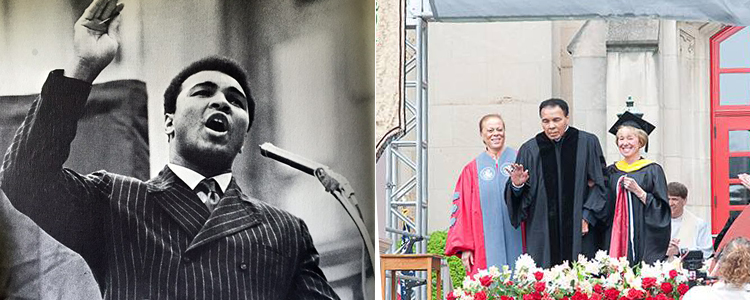 Students were at the forefront of bringing civil rights thinkers to campus. Writers and poets of the day were obvious candidates. Martha Schlenker ‘68, chairperson of the group responsible for bringing assembly speakers to campus, had read the work of poet and playwright Amiri Baraka, then known as LeRoi Jones, and arranged for him to address the first assembly of the 1967-68 academic year. Before a large audience of students, faculty and administrators and local residents, Jones read from an essay addressing the racial turmoil in his hometown of Newark, NJ. The blunt, uncensored address sent the Muhlenberg community into a turmoil of its own, as some parents, administrators, trustees and the members of the surrounding community questioned the policy of allowing students to choose their assembly speakers without vetting.
Students were at the forefront of bringing civil rights thinkers to campus. Writers and poets of the day were obvious candidates. Martha Schlenker ‘68, chairperson of the group responsible for bringing assembly speakers to campus, had read the work of poet and playwright Amiri Baraka, then known as LeRoi Jones, and arranged for him to address the first assembly of the 1967-68 academic year. Before a large audience of students, faculty and administrators and local residents, Jones read from an essay addressing the racial turmoil in his hometown of Newark, NJ. The blunt, uncensored address sent the Muhlenberg community into a turmoil of its own, as some parents, administrators, trustees and the members of the surrounding community questioned the policy of allowing students to choose their assembly speakers without vetting.
In the ensuing battle over free speech that waged that year, President Erling Jensen emerged as a hero to the student body, threatening to resign if the students were to be censored, a position that he won. The conversation continued, however; two weeks after Jones’s visit, civil rights lawyer Conrad Lynn spoke at an assembly, placing Jones’s words and the riots in Newark and Detroit in the context of American history and the civil rights struggle. The national dialogue found its way into Muhlenberg’s discourse (MW, 1967-68).
Other visitors who shared different aspects of civil rights events with the Muhlenberg community included James Farmer, who delivered the commencement address and received an honorary degree in 1968, in addition to other appearances; Floyd McKissick, Farmer’s successor as the leader of the Congress of Racial Equality (CORE), who read from his book Three-Fifths a Man; and Dr. Nathan Wright Jr., who spoke about the undervaluing of blacks in education and challenged Muhlenberg to add black faculty members.
 On March 2, 1969, baseball Hall of Famer Jackie Robinson spoke of the measures of equality that blacks demanded and deserved in education, property ownership, government representation, and the sports establishment. He conveyed to his audience that the Black Power movement existed “not out of hatred for the white people, but out of love for the black people.” He firmly placed upon white students the responsibility to “pick up the ball” for the civil rights movement (MW, 04/17/69, p.9).
On March 2, 1969, baseball Hall of Famer Jackie Robinson spoke of the measures of equality that blacks demanded and deserved in education, property ownership, government representation, and the sports establishment. He conveyed to his audience that the Black Power movement existed “not out of hatred for the white people, but out of love for the black people.” He firmly placed upon white students the responsibility to “pick up the ball” for the civil rights movement (MW, 04/17/69, p.9).
Less than a year later, on January 29, 1970, Muhammed Ali visited Muhlenberg for the first time. His much-anticipated talk had Memorial Hall filled to the brim. Ali was a year away from having his conviction overturned for refusing to serve in Vietnam, and was still barred from the boxing ring. His stance on non-violent protest as presented in his talk “Solutions to the Racist Problem as Taught by the Black Muslims” came at a period during which he faced great criticism for his position on non-integration of the black and white races. Ali’s talk at Muhlenberg met with controversy as well, from both its black and white constituents; reading the Weekly articles and editorials today is startling and revealing, reflecting back across forty-seven years at a legend-in-process (MW, 02/05/70, p.1-5). Thirty-nine years later, Ali returned to Muhlenberg to receive an honorary doctoral degree.

Muhammed Ali visited Muhlenberg twice: once in 1970 for a talk on non-violent protest, and once in 2009 as an honorary degree recipient at the College's commencement ceremonies.
In the decades that followed the social revolution of the 1960s and 1970s, Muhlenberg continued to hear from those who had been on the front lines, reminding later students that the struggle still exists both on campus and outside it. In 1988, civil rights icon Julian Bond addressed the campus about the current state of the civil rights movement. The same year, Coretta Scott King delivered the commencement address and was awarded an honorary doctoral degree.
